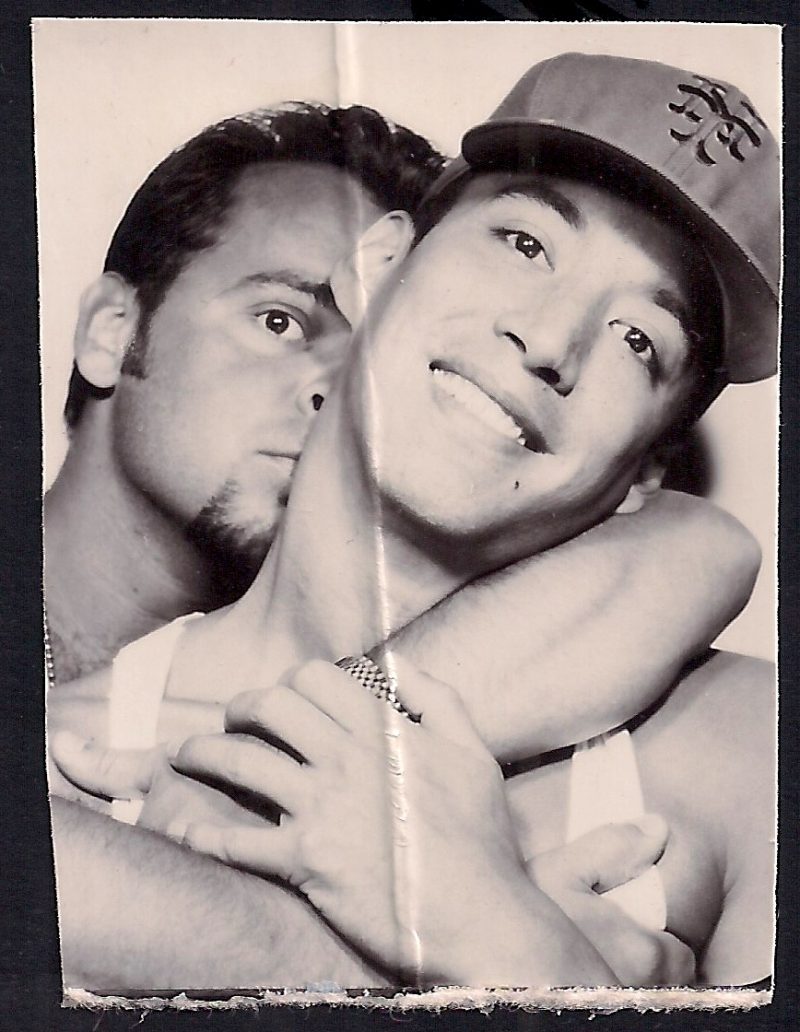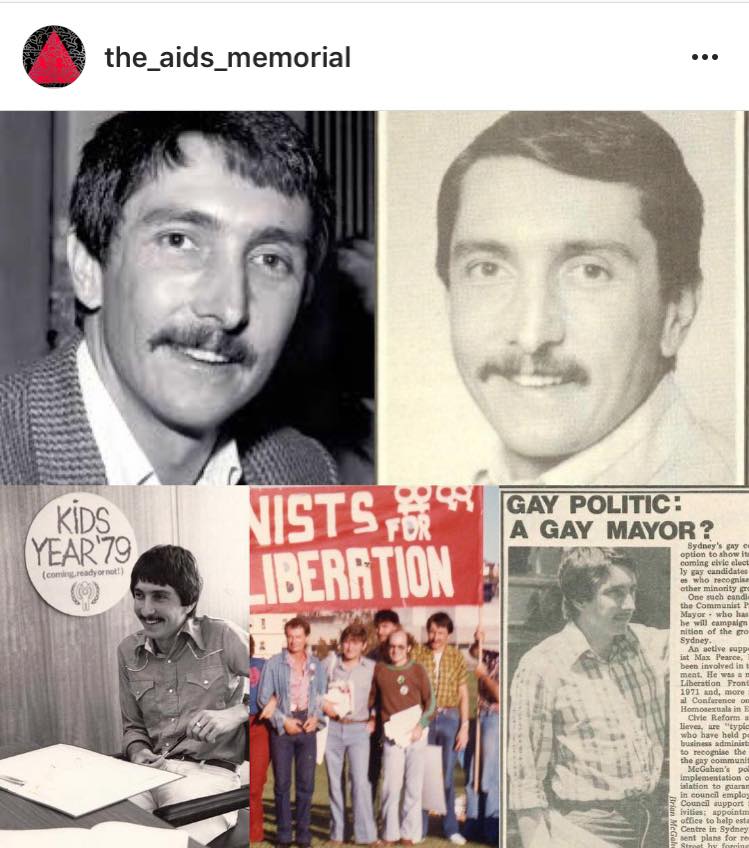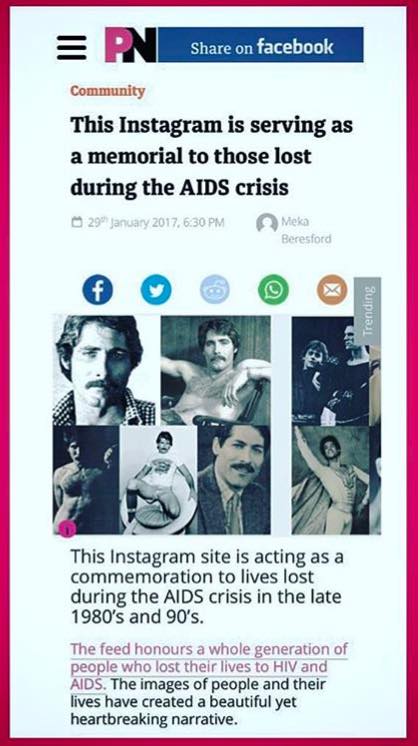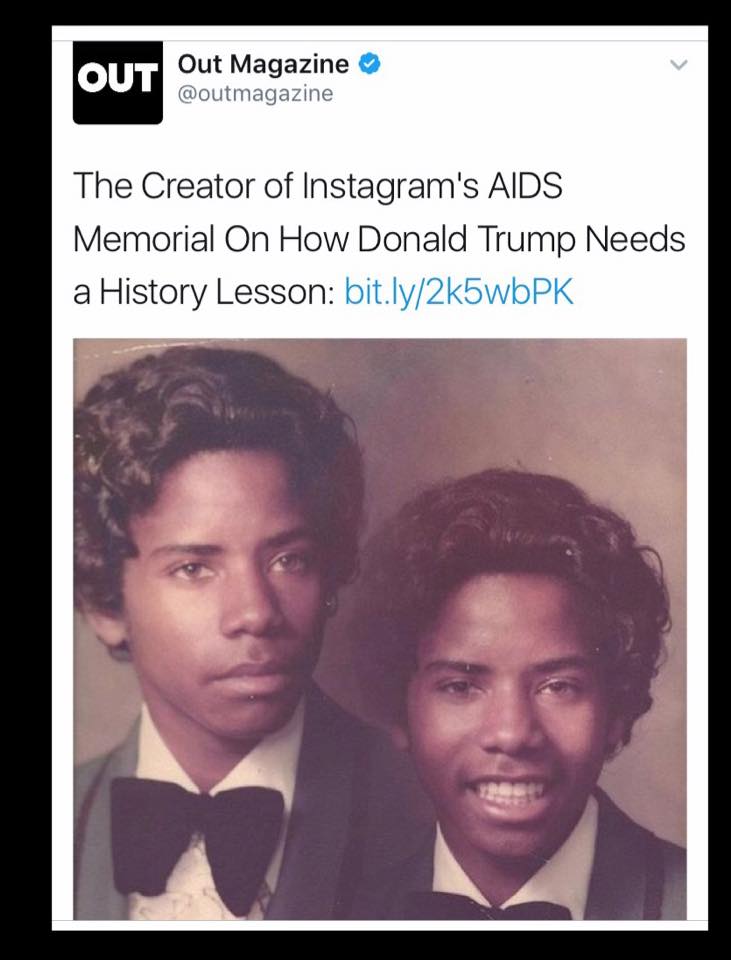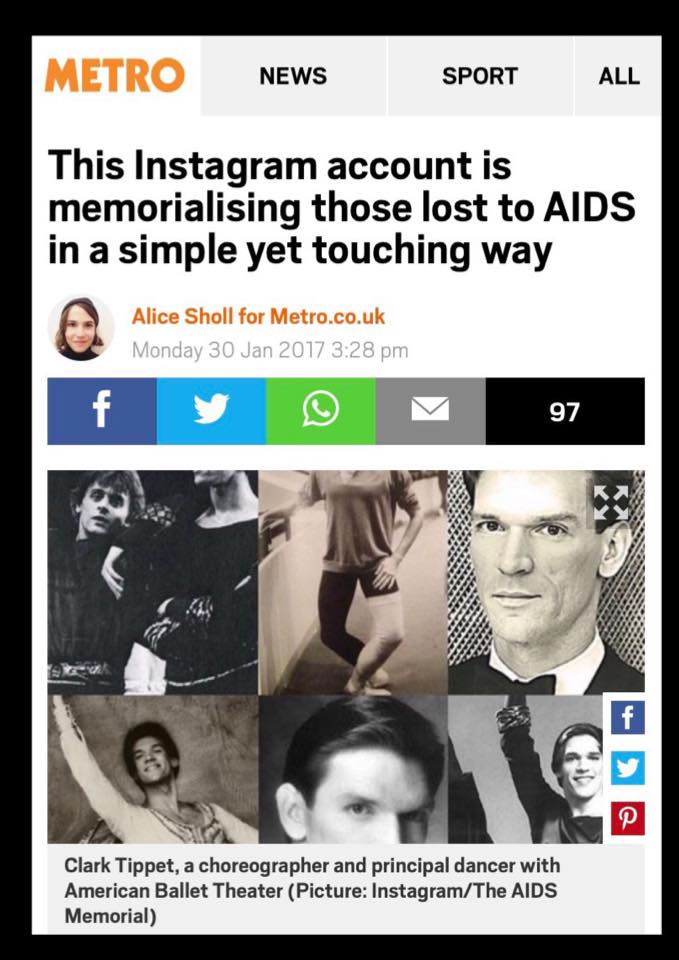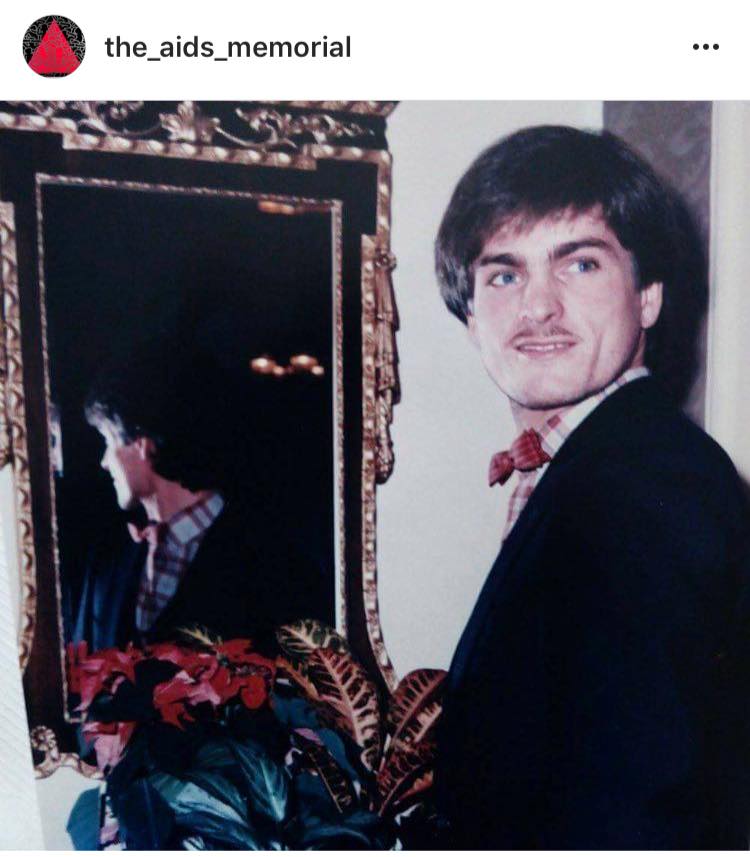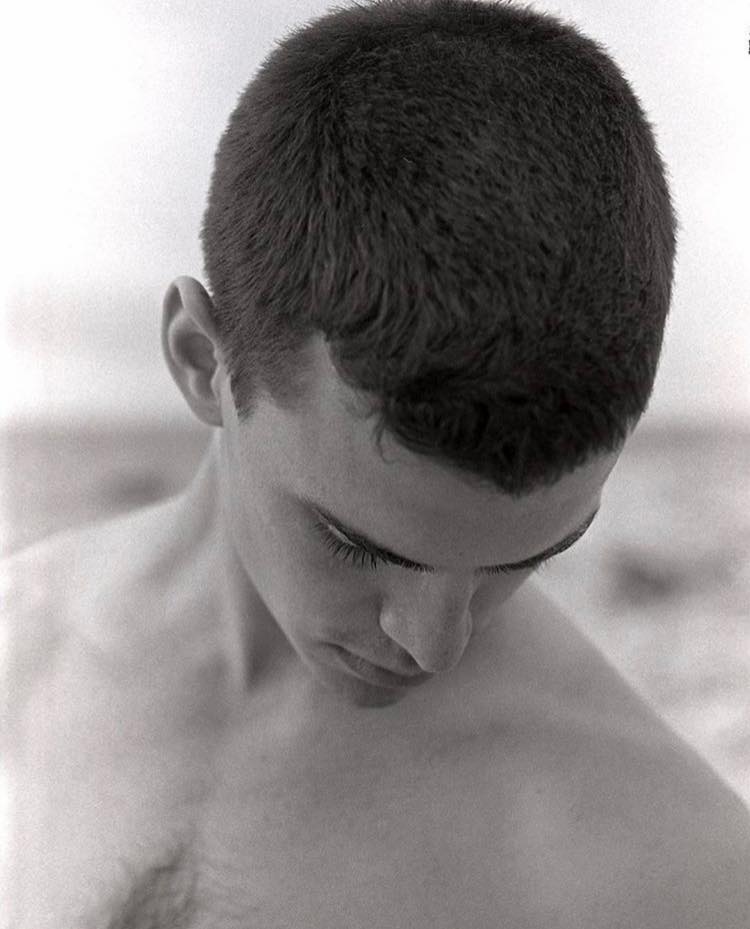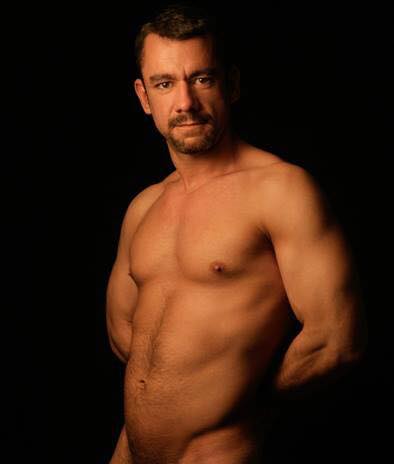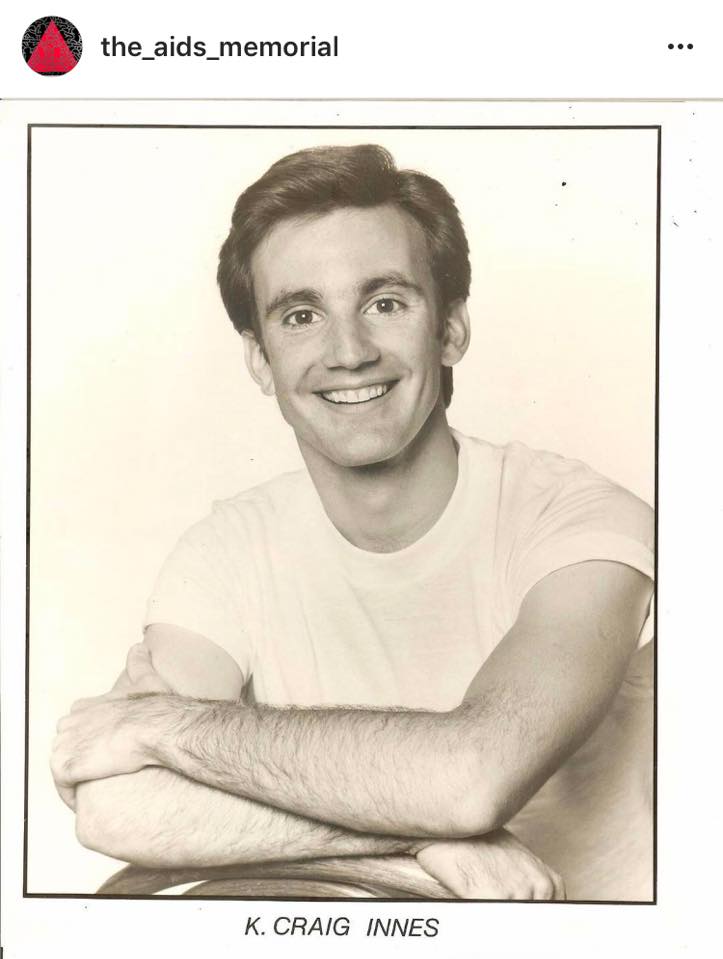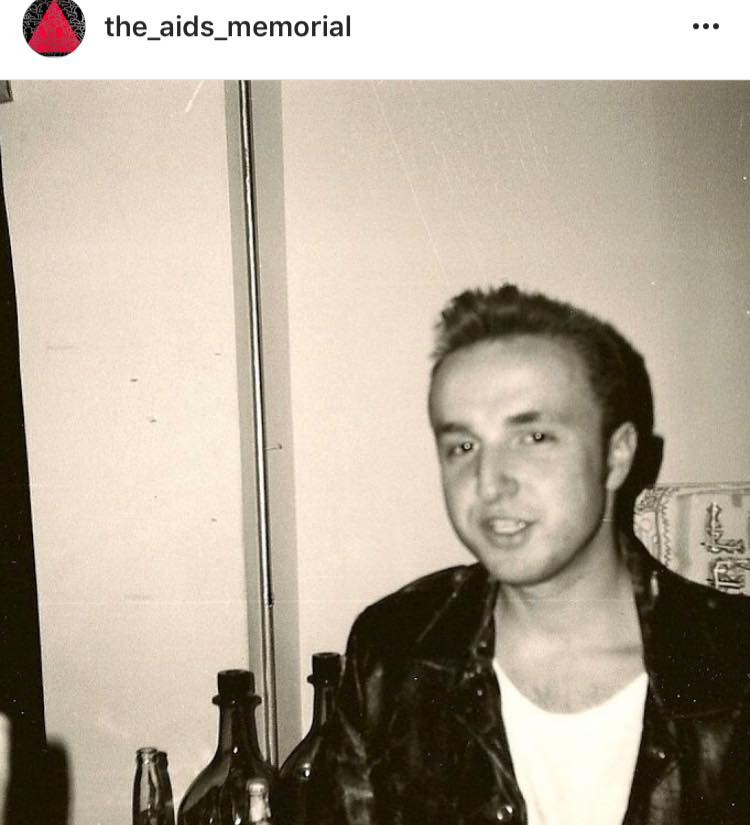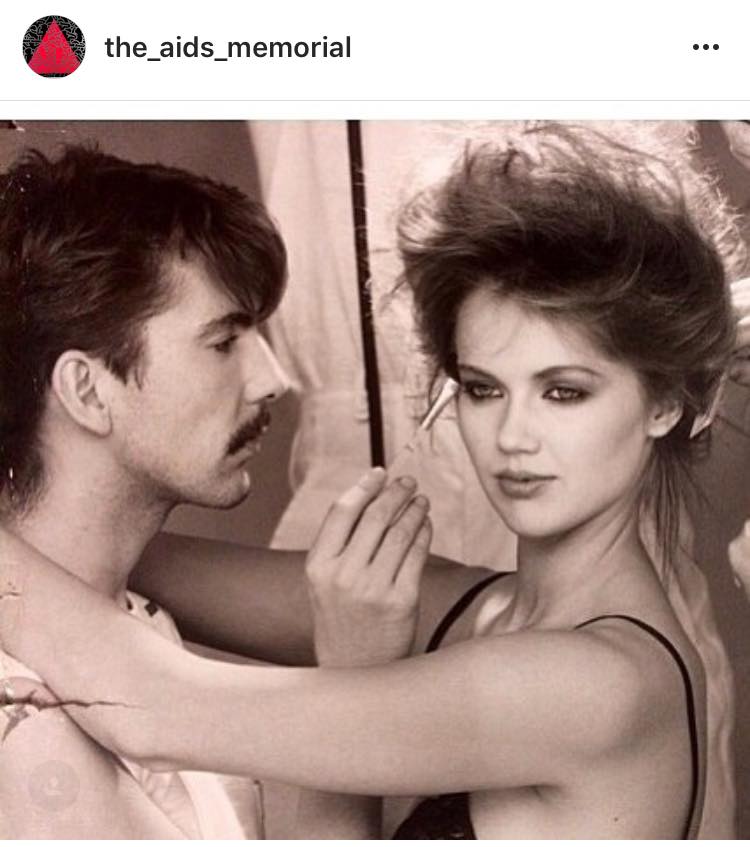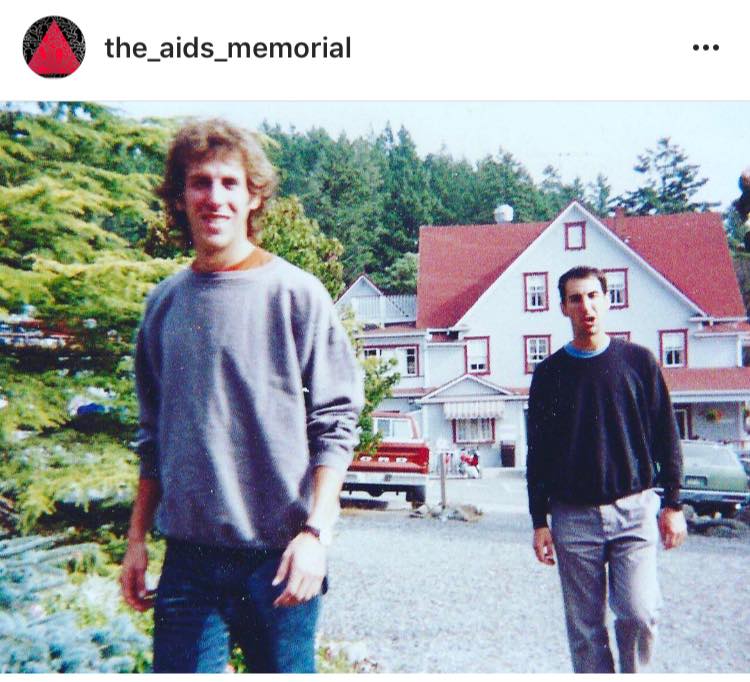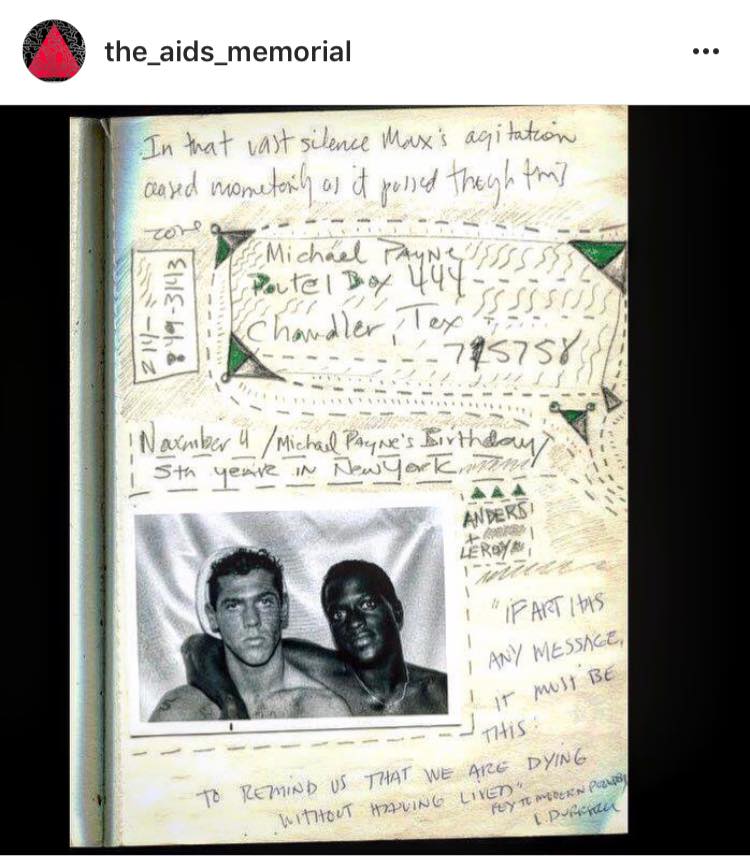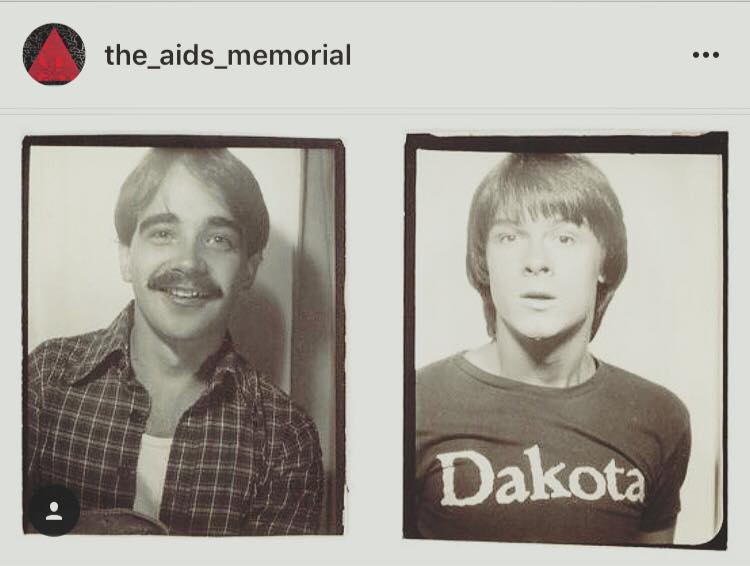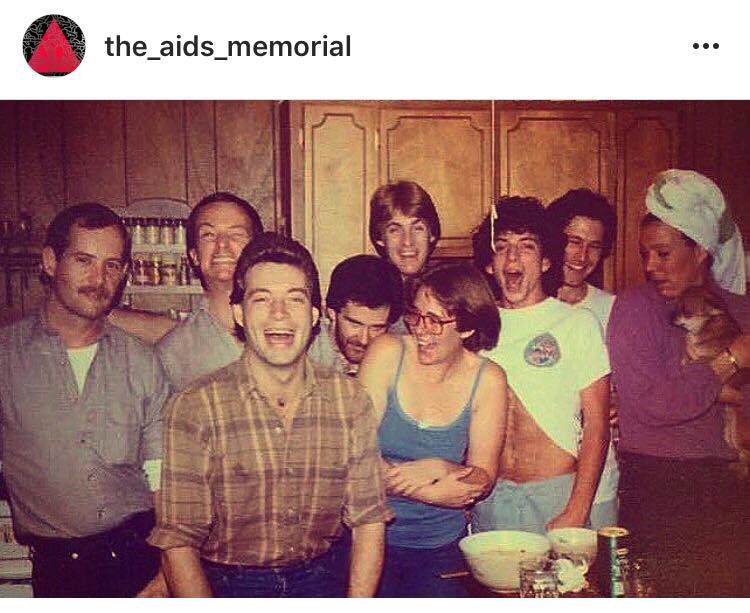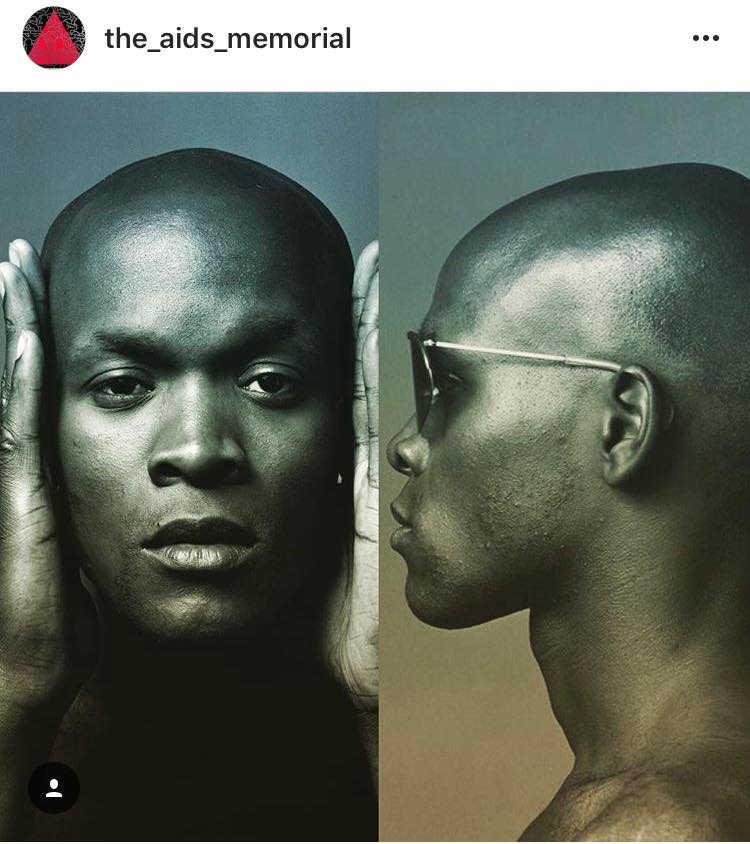Instagram’s AIDS Memorial 2017
Jaime Jesus Jimenez (18 May 1963 – 27 Oct 1995). That’s us in 1990 in a photo booth in the East Village, madly in love. I had just ‘landed’ in New York in ’89, illegally, & got a gig as bouncer & bar back @ The Bar in the East Village, New York. Jamie was the first to make a move on me. That fucken smile did it. That ride lasted 5 crazy years. The stories are endless, but one I cannot erase, is bathing him at his weakest, in the last stages of his illness. That very moment, looking at each other, knowing this was it, I felt something shift in my chest. It was my heart literally aching. Fuck I miss him”.
Listen to my story recorded here by The Aids Monument, Los Angeles, USA.
https://aidsmonument.org/stories/loss/
*
https://www.instagram.com/the_aids_memorial/
If you would Iike to contribute a story to @the_aids_memorial, it’s simple just please contact me via email 📩 theaidsmemorial@yahoo.com 🌈 each story should by roughly 405 words/2,183 characters as Instagram unfortunately sets a limit per post ➡️ Please also include a photo or photo(s)
PLEASE CONTACT: theaidsmemorial@yahoo.com
*
Interview With The Creator of Instagram’s AIDS Memorial
“Fascism did not prevail in Germany or the rest of Europe and communism could only repress the people of Hungary, Poland and the rest of the Eastern block for so long. Trump needs a history lesson. He’s not going to hold us back.”
*
By HILTON DRESDEN
THU, 2017-02-02 13:35
*
Scroll on over to @The_Aids_Memorial on Instagram and you’ll find yourself no longer in the realm of memes and shirtless men brewing coffee, but in a well-documented historical archive of the AIDS epidemic that ravaged the gay community in the latter half of the twentieth century. Posts eulogize different people whose lives were lost to this terrible virus—there are actors, artists, and celebrities, as well as regular people whose lives were cut short by by an illness stigmatized and ignored by politicians at its height.
A recent post:
#ArleneBubb remembers the conversation like it was yesterday. Say at the kitchen table talking on the phone to her son, #BrianBubb. “Do you have #AIDS?” she asked, holding her breath while inside her body was screaming “please say no.” “What would you say if I told you, yes?” he asked quietly. Bubb was trying to think of the right thing to say. What came out were the words of a mother. “We certainly would love you and take care of you and have you home here with us and do whatever we needed. I mean, you’re our son.” Nothing else was said. Brian also never told her he was gay. But she said she always knew. The day she first heard about AIDS, she was cleaning the bathtub and something came on the news. She listened and prayed that Brian would never get it. “I thought, you don’t have a son who hangs out in gay bars. … But it was always in the back of your head.” Brian, main designer for #PerryEllis, died on July 8, 1993. It was his sister’s 40th birthday. Since his death, Bubb got involved with #TheOpenGroup – a group consisting mainly of mothers who put on monthly dinners for those living with #AIDS. And then one day, she heard Brian was on the #AIDSMemorialQuilt. One of his industry friends did it, she said. It’s Brian’s own self-portrait – a caricature, his favorite. Simple. Funny. Brian. “That’s Brian,” she said. “He had such an amazing sense of humor. I think it also helped to cover up a lot of hurt in his life.” They say funny people are hiding pain, she said, sadly. “I wasn’t there to help or understand. There are so many things I wish I had known then that I know now.” Bubb has seen the quilt a few times over the years. She rode the bus down to #WashingtonDC when it was on the #NationalMall. “Those quilts, they’re just incredible. To see what people put together and about their lives and how they were loved.” Standing there, Bubb was amazed at the vast display of quilts. “There were so many there … and they all had families. It just broke my heart. We sent a man to the moon. We have medicine now. It just came too late” #whatisrememberedlives #theaidsmemorial #aidsmemorial #neverforget #endaids
The account is run anonymously by a Scottish man going by the name of Stuart. We chatted with about what inspired him to begin the site, what the project’s reception has been like and the importance of a history lesson in these dark times.
*
OUT: What prompted you to start this account?
Stuart: All types of history, even from an early age, have interested me greatly. Naturally I find LGBTQ history particularly fascinating, as it is kind of unexplored territory, especially the history of the AIDS epidemic. I feel that those who have died have been forgotten. HIV/AIDS has become a ‘chronic illness!’ No one speaks of those who have died. AIDS, it seems, is still a dirty word. I thought Instagram was the perfect medium to document the existence of those who are no longer with us and also those who were left behind. I learn a lot each day from each post and I want to share that knowledge. If I can play even a small part in keeping their legacy alive, well, my mission is accomplished!
Were you out of the closet at an early age? What was your coming out process in Scotland like?
I grew up in a Catholic household, went to a Catholic School, and lived in a small town with small-minded people. Ever seen Trainspotting? Watch this film and it will give you an idea of the Scottish mindset at this time. I felt judged in all aspects of my life, even before I realized I was different, i.e. gay. I definitely carried Catholic guilt well into my early 30’s. It was inevitable.
As a kid I had no role model. Gay people only existed on TV. When I heard them being discussed, it was always negative and derogatory. I knew I was different from an early age. I didn’t want to be gay, but I knew I didn’t want to part of the fascist majority either. I just didn’t fit it. But then in my mind I tried to convince myself that liking men was just a phase. I was going to get married, have a family, that was it. No buts! No pun intended. Who was I kidding?!
Although I was a youngster in the 1980’s I still remember those chilling public information adverts on TV commissioned by Thatcher’s government. I also quite clearly remember how the gay community was vilified by the media in the press, on TV, and at school and then along came AIDS to add to the discussion. I thought it was all so depressing and in hindsight, AIDS made it even more difficult for me to come out as a gay man and live my life. Even when I did, eventually, at 19 (still too late in my opinion) I still did not want to know the gory details regarding HIV/AIDS. So looking back, regrettably, I switched off. I am ashamed to say that I did not read about Freddie Mercury or Rock Hudson or Elisabeth Glaser or anyone else for that matter. I wanted to be detached from that world. I was scared. I can’t now imagine what it must have been like to have actually lived during that period with AIDS. All that judgment and stigma. I remember quickly turning the page when I saw an obituary. It is ironic that I now actively seek them out. HIV/AIDS always stayed in the back of my mind. There was no escaping AIDS. I was scared that it would happen to me and I stupidly thought that by ignoring any news about it meant that I might never be touched by it. Very ignorant I know! I’m glad that I matured.
You receive submissions for eulogies of friends, family, and lovers from all over. Any submissions that you were surprised to receive?
Not surprised, but more disappointed, when I have received messages asking me to “slow down with the postings dude—its too depressing to read.” Well, you know what? I’m not going to budge on the frequency of the posts. Imagine a time when your whole peer group is wiped out, one by one, relentlessly every day? Imagine how you would feel? Slow it down dude? Seriously? Go follow Kylie Jenner. This account is not about phony self-presentation. I mean, the name of the account should at least give you a hint of what I am presenting.
You mentioned people give lots of Insta-love to, say, Freddy Mercury, but less so to regular people. Is there an individual you see as your gay idol?
I think it’s only natural that there seems to be more Insta-love for more well-known figures like Freddie Mercury or, say, Rock Hudson. After all they’re very famous public figures; they have fans who worship them still to this day. I can’t say that I idolize anyone, to be honest. But I was a kid in the 1980’s and Madonna became a huge star and it’s amazing to know that she was on our side. She was mainstream and didn’t have to be. Big stars back then didn’t want to be associated with AIDS in case it fucked with their record sales. She was fearless. I loved that. She first lent her support to HIV patients in a time when most people treated a person with AIDS like a pariah.
Her dance teacher, Christopher Flynn, was HIV positive and when he publicly divulged that he had the virus, the two appeared together at a 1989 Dance-a-Thon to support AIDS Project LA. I can’t forget the impact she made on me in her 1991 documentary Truth or Dare where she prays with her amazing dancers before taking the stage during the Blond Ambition tour for an AIDS benefit show. During the prayer she tears up, remembering those she’s lost to AIDS, including Flynn and her best friends Martin Burgoyne and Keith Haring. Her support early on, during the height the AIDS epidemic, even led people to believe she was HIV positive, but she didn’t care. The rumors didn’t stop her then and they certainly aren’t stopping her now as she works with her organization, Raising Malawi, and continues to advocate for those who live with HIV/AIDS in Africa and around the world. She’s always been a trailblazer.
Is there a post you feel is the most important you’ve published to date?
I would not say that any post is more important than another. What I would say is that the posts where you have a mother, or a niece, for example, remembering their dear son or uncle, are very special because it’s more personal, more intense. It might be that they have never shared their story before because family code meant that it should remain a secret. The stigma was huge back then—still is—and to think that they couldn’t even talk about it until now is so heartbreaking.
What’s the feedback been like on the account? All supportive? Any reactions you weren’t expecting?
The 99% of feedback has been amazing! To get such positive messages emailed to me and left on the page is so gratifying. To be told recently by a follower that the page is second only in their opinion to the AIDS Memorial Quilt leaves me speechless. Or to be messaged and informed that the page gives people so much comfort as they realize that they weren’t the only ones to have to endure hate, stigma, and secrecy when their loved one died of AIDS back in the day. They finally realize now that they aren’t alone in their sorrow and can take solace in that. I’ve been told my page is like a public service. What can you say to that except, Wow! Just wow! It makes me so happy to touch so many people on a daily basis.
And now to be featured, for example, in i-D magazine online, Gay Star News, and now Out, I feel the word is getting out and that can only be a benefit to those I feature on this page and those who follow. I get asked why the hell I use hashtags and that it’s inappropriate. Well, I want the words AIDS, HIV, HIV/AIDS, PCP, and Kaposi’s sarcoma, for example, littered all over Instagram, not only to bring people back to my page in order to make sure that those who have died are not forgotten, but also to get away from the idea that these words should be hidden from public view, or are unpalatable or dirty. I want to fight stigma in some small way.
I suppose I didn’t expect a posting that I did a while back that recalled the time when Rock Hudson met with Ronald and Nancy Reagan at the White House to receive such attention. Some felt that even having the Reagans mentioned on the page at all was disrespectful to all those who had died from AIDS in the USA. Quite a big statement to make. The whole point of the post was in fact to again underline the Reagans’ inaction during the AIDS crisis, and how Nancy did not go out of her way to help even her ‘friend’ Rock when his personal assistant approached her on his behalf desperate for her assistance in his dying days. What chance did anyone else have when you look back at how she treated a friend?
Donald Trump—is there something you’d say to his face if you could? Is there a message you’d give to LGBTQ Americans who are frightened right now of the coming four years? To other minority groups?
I tend to agree with Mark Twain when he said, “Never argue with stupid people, as they will drag you down to their level and then beat you with experience.” But this is different. It is our moral and public duty to challenge Trump and his supporters. I would start by asking him if he is aware that Christian and domestic terrorists have caused more deaths since 9/11 than radical Jihadist terrorists? Does he think that we should prevent immigration of Christians? Monitor Christian churches? Register all Christians with a federal bureau? How is insulting women not a sign that he is clearly a misogynist? My questions would be endless. The Scots are not particularly fond of Trump and his Scottish ancestry. He has pissed a lot of people off over here even before he ran for president, with the golf courses he built in Scotland. In fact, the UK parliament now has to debate the proposed Trump visit after 1.6 million of us signed a petition to stop him from coming over here.
I grew up in Thatcher’s Britain when she introduced Clause 28. I lived in a small town where homophobia was rife and there was no chance to meet anyone like me until I was 16, and even then it was illegal for me to have sex with a man due to the inequality of the age of consent. What I’m trying to say is, I got through this even in the face of adversity. People have gone through much worse. Fascism did not prevail in Germany or the rest of Europe and communism could only repress the people of Hungary, Poland and the rest of the Eastern block for so long. Trump needs a history lesson. He’s not going to hold us back.
If people want to read up on their gay history, do you have any book or movie recs?
Wow, there are just too many too mention. For starters, I love YouTube, as there are so many gems that you can find. For example, look for Vito Russo’s Our Time, which is a television series that he produced and co-hosted in 1983 which is focused on the gay community. There are about 13 one-hour long episodes that you can watch which cover the AIDS crisis and feature interviews with Larry Kramer, Brad Davis, Lily Tomlin, and other notable public figures. It also has person-on-the-street interviews! In my opinion, an outstanding online visual archive.
I also adore the GLBT Historical Society website, where they have these incredible audio archives dating back to the 1970’s, including Randy Alfred’s The Gay Life radio series and Kevin Burkes “Fruit Punch” recordings. I’ve listened to these over and over again. Invaluable. Gives you a real insight into the issues faced by the LGBTQ community back in the day.
Must reads are anything by Edmund White, of The Violet Quill, and who has been unapologetically HIV-positive since the 1980’s. I especially love his memoirs My Lives (2005), City Boy (2009), and Inside a Pearl: My Years in Paris (2014). I always try and seek out audio recordings of his interviews as he is always so eloquent, humorous and informative.
